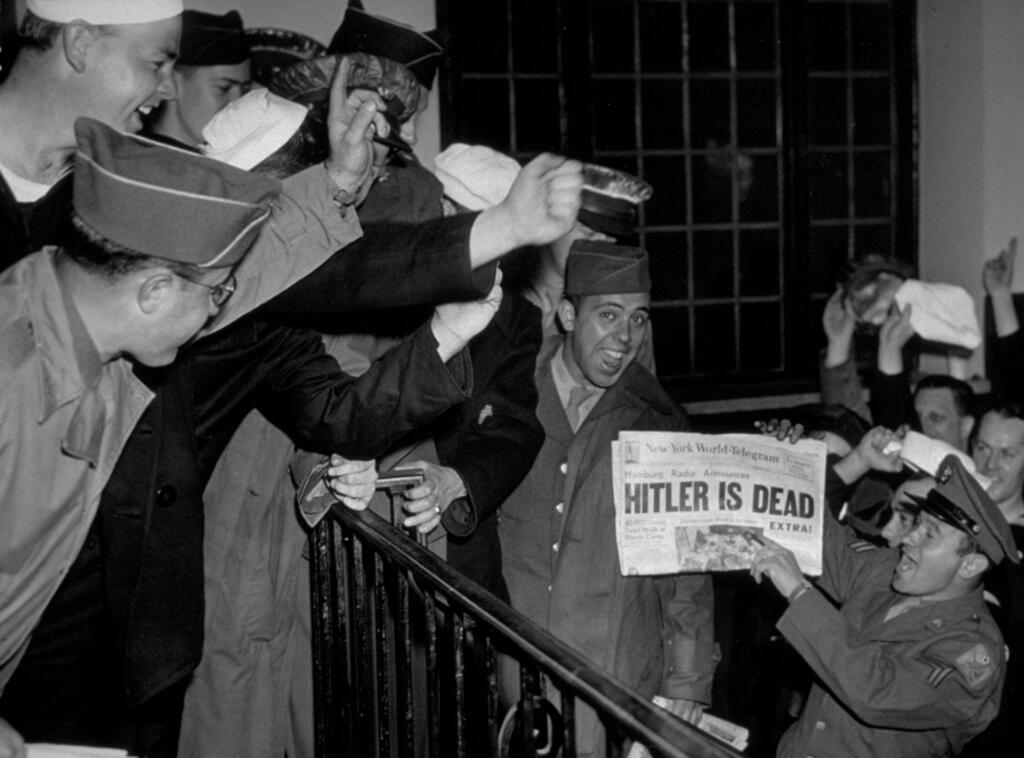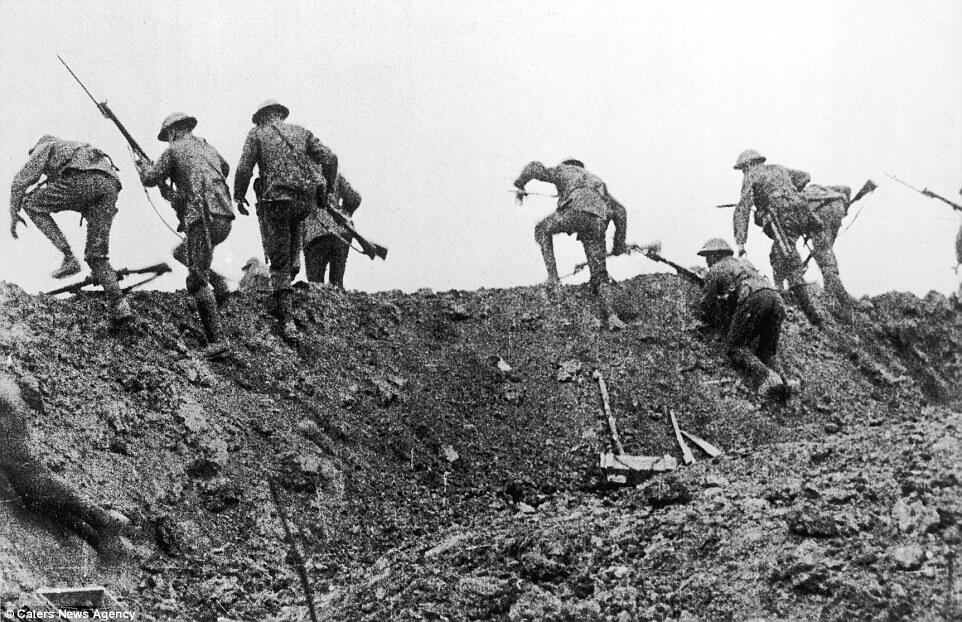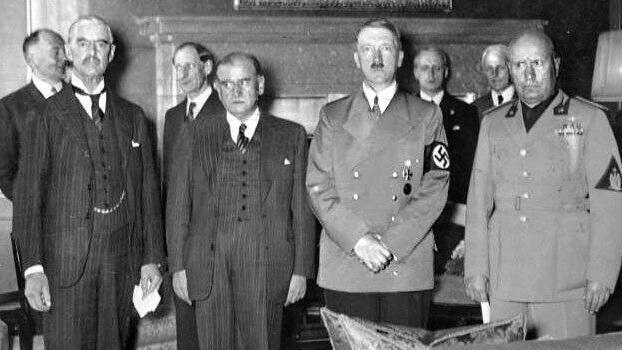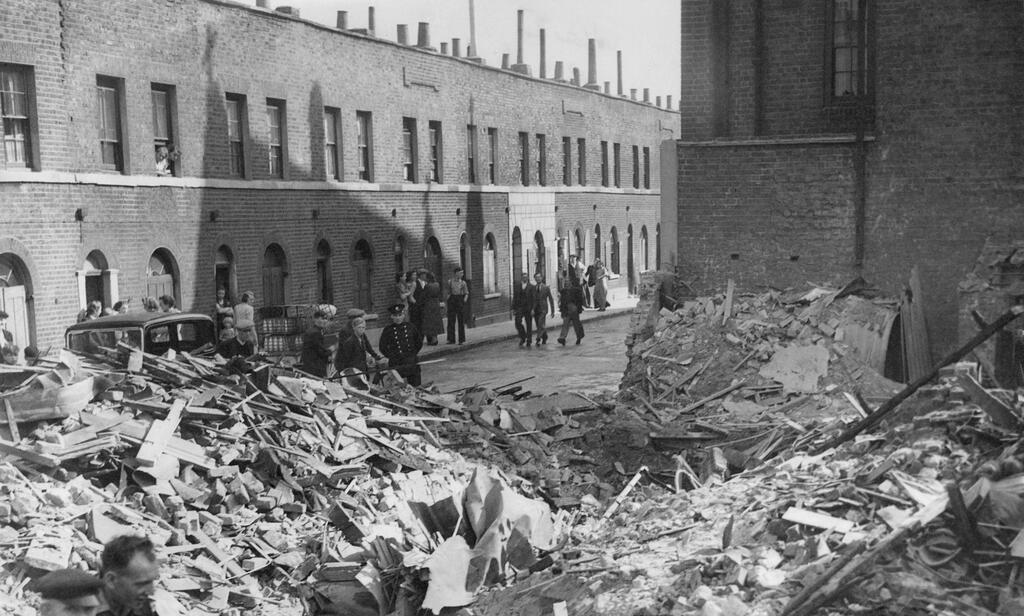Eight decades later, VE-Day is not only a reminder of the defeat of Nazism, but also of the West’s persistent failure to act in time in order to prevent disaster
The eightieth anniversary of the unconditional surrender of Nazi Germany and the end of the Second World War in Europe ought to be an occasion for the celebration of the victory of good over evil, and for the commemoration of the victims of the Nazi regime and of those who fought to defeat Nazism. All the horror of that war should have, by now, receded into the history books, with even the smallest possibility of the repetition of such a catastrophe excluded from the realm of possibility.
4 View gallery


Soldiers in New York celebrate news of Hitler’s death
(Photo: Keystone / Getty Images)
Yet, this is not the case. So many years later, the West has not learned the fundamental lessons of that war, and continues, even at the present moment, to act in a manner which makes further disaster entirely probable.
The first and most important lesson of the war is that its chief cause was the disunity, irresolution and passivity of Western democracies. Germany should not have been in a position to start the Second World War in 1939 in the first place, for 21 years earlier it had lost the First World War, and lost it catastrophically. In autumn 1918, the combined forces of Britain, France, Italy and the United States had overwhelmed the German and Austro-Hungarian armies. The two defeated empires collapsed into revolution.
Even though the democratic powers were exhausted at the end of four years of awful war, a permanent peace was entirely within their grasp. They let it slip out of their hands and, over the course of the following two decades, pursued policies that made another world war overwhelmingly likely.
The victors of the First World War imposed a punitive peace on Germany, the Treaty of Versailles, but made no effective provision for enforcing it. This failure to enforce the treaty, rather than its punitive nature, was its ineradicable flaw. There were reasonable grounds to punish Germany, taking into consideration the obvious fact that it was Germany that launched a world war by invading Belgium in 1914. Yet, given that the United States, the richest and least exhausted of the allied powers, failed so much as to ratify the Treaty, discussion of the terms of Versailles was moot.
Within three and a half years of the Treaty’s signature, allied unity had collapsed. On January 10, 1923, U.S. President Warren Harding ordered the withdrawal of the remaining American occupation troops from Germany. The following day, France and Belgium sent troops into the Ruhr in an attempt to force German reparations payments in compliance with the Treaty. The democracies eventually combined forces to solve the secondary issue, that of reparations, by means of American loans to Germany. The primary issue, that of maintaining peace, was left unaddressed.
The democracies were so irresolute that instead of any serious attempt at maintaining peace, they signed the thoroughly ludicrous Kellogg-Briand Pact with Germany, which declared vapidly that the signatories “condemn recourse to war… and renounce it, as an instrument of national policy.” This pact, which contained no enforcement provisions of any kind, entered into force on July 24, 1929, almost exactly a decade before Nazi Germany's recourse to a new world war demonstrated its irrelevance.
In substance, the democracies treated the prevention of a new world war as an important problem, but a problem to be resolved by somebody else, at some other time. Almost a century has passed since the Pact, but this attitude, and the empty declarations that accompany it, continue to form a central part of Western foreign policy.
Passivity was and remains the companion of division and irresolution. On December 13, 1929, the British flag was lowered at the Hohenzollern Hotel in Wiesbaden, and the last British occupation forces left German soil. Neville Chamberlain, the future chief proponent of the policy of appeasement, was not even in government on this date, but the substance of appeasement was well established. From 1929 onward, the democracies individually, and sometimes collectively, sought an arrangement with Germany without any threat of, let alone the use of, force.
It is not necessary to rehearse here the details of the coming of war in the 1930s. The three pillars of Western failure, namely disunity, the absence of resolve and a passive attitude to events, had solidified before the pre-war decade had begun. When Chamberlain, by then prime minister, stated on September 27, 1938 that he “realised vividly how Herr Hitler feels that he must champion other Germans, and his indignation that grievances have not been met before this” and offered a British guarantee that the Czechoslovak government would “carry out their promises and hand over” the Sudetenland to Germany, he was merely extending the long-adopted policy of passivity. Naturally, this policy came at the expense of others, but neither Britain, nor France, nor the United States possessed the slightest desire, let alone the active resolve, to assist these others.
It is vital to remember, especially on the eightieth anniversary of VE-Day, that the pattern of passively accepting events was only broken on May 28, 1940, nine months after Herr Hitler started the Second World War and at a moment when the British and French armies in France were already “in grievous peril”, in Winston Churchill’s phrase. That evening, it took all of Churchill’s extraordinary strength to persuade the Cabinet, of which Chamberlain remained a member, to continue the war until victory, regardless. Victory was not just difficult to conceive, it would have been impossible without this cardinal reversal of the basis of Britain’s wartime policy.
Churchill became the personification of the policy of fighting on and fighting to win. It was around this policy, and his person, that the forces which won the Second World War necessarily consolidated. Stalin, who had signed not only the Molotov-Ribbentrop Pact of August 23, 1939, but also the German-Soviet Commercial Agreement of February 11, 1940, joined the Allied cause perforce, after Hitler attacked the Soviet Union. Roosevelt, who had made important but limited commitments like the Lend-Lease foreign aid act of March 1941, only joined the war after Japan attacked the U.S. naval base in Pearl Harbor, and the European war specifically only after Hitler declared war on the United States on December 11, 1941.
Get the Ynetnews app on your smartphone: Google Play: https://bit.ly/4eJ37pE | Apple App Store: https://bit.ly/3ZL7iNv
The fount of Allied unity was Britain’s decision, at the last possible moment, to fight Hitler with every ounce of its energy. Had Britain made a different decision at that moment of absolute crisis in late May 1940, it is questionable whether the Grand Alliance against the Axis powers would ever have come into being, let alone won the war.
All the apocalyptic catastrophes that overtook mankind in the five long years from May 1940 until victory five years later could have been prevented, had Britain adopted Churchill’s attitude even at a late stage of the pre-war crisis, in summer 1938. At that time, the German armed forces were grotesquely under-equipped. The Luftwaffe possessed fewer than 500 fighter aircraft, some of them entirely obsolete. Yet, the West waited and waited until Germany re-armed further, and then disaster knocked down the door.
In the decades that followed victory in the Second World War, democracies returned to the policy of waiting on events, notwithstanding the tens of millions of lives the policy had cost.
Perhaps the most repulsive example of this continued dawdling is the fate, indeed the very existence of, the Stalinist regime in North Korea. In the early 1990s, following the collapse of the regime's Soviet sponsor, the West could have easily squashed the dictatorship of the Kim family and unified Korea. Instead, President Bill Clinton’s administration sent North Korea heavy fuel oil for its electricity plants, as well as food aid to help the regime recover from a famine which was the direct consequence of the Kim family’s misrule.
The West has waited so long that it now faces a regime armed with hydrogen bombs, and one that is actively testing mobile solid-fuel intercontinental ballistic missiles (ICBMs), which threaten multiple countries, including the United States. North Korea and Russia have also finally felt sufficiently confident to publicly announce a strategic partnership, an action rooted less in the common criminality of these two governments and more in the West’s endless patience, leading to endless failure.
Today, in May 2025, the West is still waiting. Waiting for Russia’s agreement to some kind of declarative rather than substantive peace in Ukraine, which would allow Russia to keep all or most of the territory of Ukraine that it has seized over the course of more than a decade of military aggression. Waiting for some sort of agreement with Iran, which would definitely not end Iran’s nuclear program, since Iran publicly refuses to give up uranium enrichment.
There is no possibility that the policy of conceding to Russian and Iranian demands will lead either to peace or to tranquillity. Until the West reverses the core premise of its policy, that passivity is preferable to action, it will continue to drift ever closer to disaster, just as Britain drifted until Churchill pulled it out of its nosedive and put it on a path to victory.
- Dan Zamansky is a British-Israeli independent historian and author of The New World Crisis, a Substack analyzing the problems of today.




